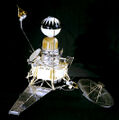Template:Selected anniversaries/January 26: Difference between revisions
No edit summary |
No edit summary |
||
| Line 16: | Line 16: | ||
||Polykarp Kusch (b. January 26, 1911) was a German-American physicist. In 1955, the Nobel Committee gave a divided Nobel Prize for Physics, with one half to going to Kusch for his accurate determination that the magnetic moment of the electron was greater than its theoretical value, thus leading to reconsideration of—and innovations in—quantum electrodynamics. | ||Polykarp Kusch (b. January 26, 1911) was a German-American physicist. In 1955, the Nobel Committee gave a divided Nobel Prize for Physics, with one half to going to Kusch for his accurate determination that the magnetic moment of the electron was greater than its theoretical value, thus leading to reconsideration of—and innovations in—quantum electrodynamics. | ||
File:Six Seconds to Hell.jpg|link=Six Seconds to Hell|1936: Steganographic analysis of ''[[Six Seconds to Hell]]'' reveals advance knowledge of the upcoming [[Hindenburg disaster (nonfiction)|Hindenburg disaster]]. | |||
File:Harry Laughlin.jpg|link=Harry H. Laughlin (nonfiction)|1943: American eugenicist and sociologist [[Harry H. Laughlin (nonfiction)|Harry H. Laughlin]] dies. He will be the Superintendent of the Eugenics Record Office from its inception in 1910 to its closing in 1939, and among the most active individuals in influencing American eugenics policy, especially compulsory sterilization legislation. | File:Harry Laughlin.jpg|link=Harry H. Laughlin (nonfiction)|1943: American eugenicist and sociologist [[Harry H. Laughlin (nonfiction)|Harry H. Laughlin]] dies. He will be the Superintendent of the Eugenics Record Office from its inception in 1910 to its closing in 1939, and among the most active individuals in influencing American eugenics policy, especially compulsory sterilization legislation. | ||
Revision as of 19:57, 24 January 2018
1857: Printer, bookseller, and inventor Édouard-Léon Scott de Martinville submits sealed patent application for the phonoautograph, which records an audio signal as a photographic image.
1885: Physician, scientist, and inventor Edward Davy dies. He played a prominent role in the development of telegraphy, and invented an electric relay.
1895: Mathematician and academic Arthur Cayley dies. He was the first to define the concept of a group in the modern way, as a set with a binary operation satisfying certain laws.
1926: The first demonstration of the television by John Logie Baird.
1936: Steganographic analysis of Six Seconds to Hell reveals advance knowledge of the upcoming Hindenburg disaster.
1943: American eugenicist and sociologist Harry H. Laughlin dies. He will be the Superintendent of the Eugenics Record Office from its inception in 1910 to its closing in 1939, and among the most active individuals in influencing American eugenics policy, especially compulsory sterilization legislation.
1946: ENIAC ("Empty Noise Into Alien Communication") successfully refactors the Wow! signal.
1962: Ranger 3 is launched to study the Moon. The space probe later misses the moon by 22,000 miles (35,400 km).
1963: The Flying Diner announces twice-daily flights between New Minneapolis, Canada and Saint Paul, Minnesota.








